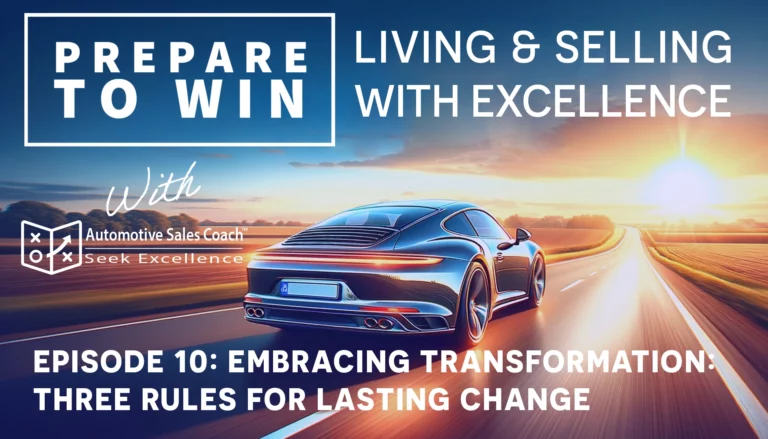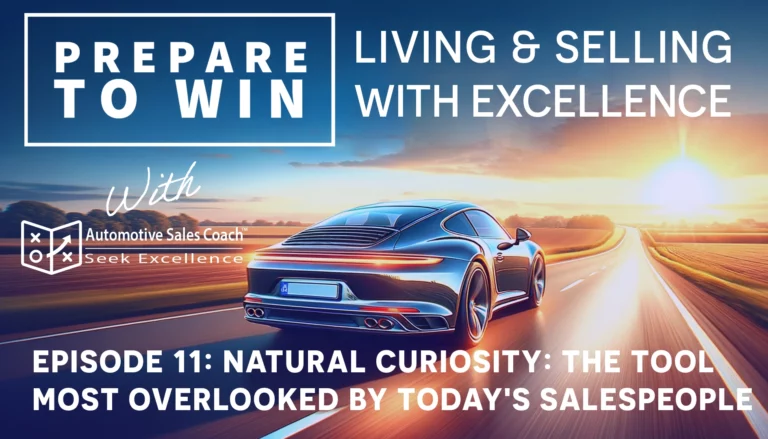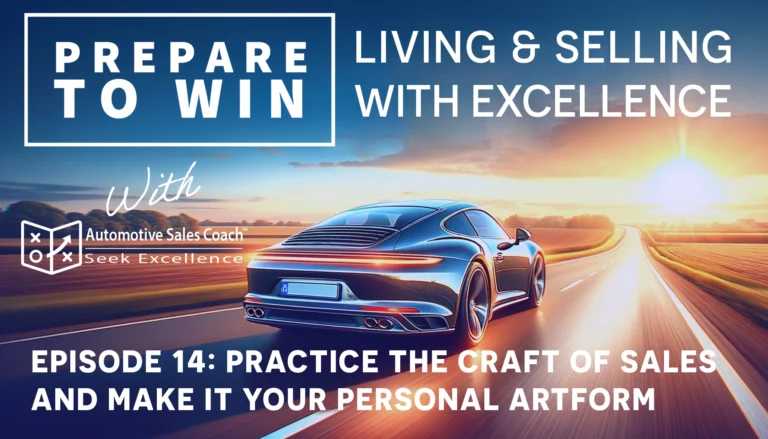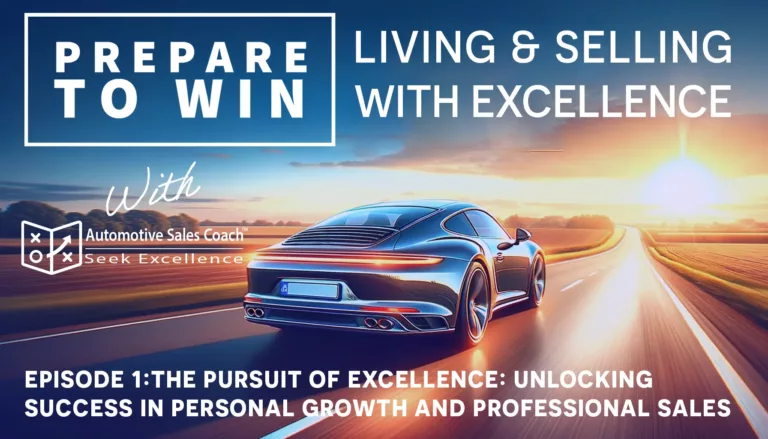Join us as we explore a fundamental truth: your commitment level directly influences your success. This discussion offers practical strategies for enhancing commitment within your dealership, fostering a culture of continuous improvement and leadership. It’s a conversation packed with insights beneficial for both seasoned professionals and those new to the automotive industry. Join us as we uncover how to elevate commitment and drive success.
David Lowe: 0:00
The level of your commitment will determine the level of results. Isn’t that true? That’s true. It’s not just at work, but in life as well. Stay tuned.
Grace Lupoi: 0:18
Welcome to Prepare to Win. I’m Grace Lupoi and and I’m here with David Lowe, and today we’re talking about levels of commitment, right, and we know that most will do some and some will do most, and we’ve kind of broken that down into three different areas that we kind of like to talk about with people that we work with right.
David Lowe: 0:32
Right? So it’s so important. It’s not just work, it’s life. The level of your commitment determines the level of your success, right? So we see this.
David Lowe: 0:41
Well, this whole podcast and every episode is about living with excellence, working with excellence, and so we study a lot of the principles that have always existed, the principles of natural law always existed, and updated techniques and technologies. The principles never change, but how we respond to them definitely does. Today, we’re talking about the principle of commitment, right, and I think if you go back 2,000 or 3,000 years, you could say that you reap what you sow, right? That’s a common phrase. You get out of something what you put into something, right? And so we’re going to talk in this episode about you said it a couple different levels of tiers of commitment, right? Where are you at in your level of commitment and maybe what would make you want to change your level of commitment, right? So I think that I don’t care who you study. I read a great quote from the great coach from Indiana. What’s his name? The chair thrower, oh, Right, okay so you his name, the chair thrower.
David Lowe: 1:46
Oh Right, okay, so you guys know who I’m talking about, but here’s the thing he was a great coach. In so many ways Maybe the chair throwing took away from it, right, but the point that he said that the will to succeed is important, but the will to prepare is more important, right. And so when we’re talking about commitment, we’re really talking about what are you willing to do to succeed? Wanting to succeed, but doing. Now we know that. Truett, cathy, we’ve talked about his three principles desire and drive. The desire and drive to succeed, developing the know-how and then taking action. So, no matter who we study right from great coaches to great businessmen, to people who’ve achieved much, we see the principle of commitment, don’t we? We do Reap and sow, and so I think that, well, we’ve narrowed down three levels.
David Lowe: 2:45
And these are generic and maybe there’s degrees in between, but we have well for us. We have our training and our training platform online. It’s a turnkey system, which means that any dealer can use it to develop a manager-led culture of ongoing training. That’s how we developed it. So, as a sales manager myself, I thought what would I have wanted to have at my fingertips? And so we have all the downloads, all the videos, all the quizzes, all that’s designed to create this manager. They don’t have to create anything. It’s training in a box. Okay, so you get that into a dealership. What level of commitment are we at Right? And we gauge that right. We’ll go into a dealership. What level of commitment are we at right? And we gauge that right. We’ll go into the dealership and we’ll see some that are very passive. You’ve seen it.
Grace Lupoi: 3:30
Yes.
David Lowe: 3:31
They sign up for training, they want training, they know they need training and they oh, here you go, guys, here’s the training, we’ve got it for you. That’s pretty much it. We hope you use it. Pretty much it. We hope you use it. You better use it, you should use it, and typically at the passive dealer, we find that this is really typically a leadership problem, where leaders aren’t committed to doing it themselves, but they’re getting it for everybody else. So we know that real change starts at the top and we’ll see. Passive dealers are like we’re going to invest in the training and we’re going to let everybody decide if they’re going to use it or not. More or less right, great intentions though they know they need it. They do something that non-training dealers don’t do, so let’s give them credit for that, and I don’t believe they’re getting the most from the training package because they’re not really engaging.
David Lowe: 4:24
Okay, so think about you at home. You buy a NordicTrack bike, right? I talked about my NordicTrack bike in previous episodes. Freaking love that bike and I buy it. What is my level of commitment? Do I buy the bike, put it in the room and then plan on maybe using it sometime? I know I should, and I bought it because it should. I like having it and I definitely plan on using it. But what is my level of engagement? Right, if I’m passive, I probably don’t use it that often. Right, it might be holding close, right? Okay, so we have passive and then we have the next one. Might be called active Again, generic terms but an active dealer for us is somebody who’s a little more engaged.
David Lowe: 5:09
Right, they’ve got the system, they want the training and they’re using different parts of it, maybe not as a habit, but they’re using it, they’re engaging with it and maybe the flow goes in and out. Right, and I think, probably, if you’ve got that Nordic Trek bike and you’re thinking, wow, I feel fat today and you ride, right, well, I need to get shape, and you ride for a week, you’re all about it, or a month, and the next thing you know you’re not doing that might be active. You’re doing it off and on, but not really in a focused way. So we move from passive I’ve got it, I hope to use it to active. I got it and I’m using it. I’m not as consistent as I want to be, but I’m getting better results.
David Lowe: 5:56
Now, in the passive area we see well, you see this, you’ll go in there and there’s salesmen killing it with the train. You said it some, right, do most and most do some. So in the passive dealership, the some are benefiting, aren’t they? That’s right. In fact, we often say that a train will never cost you a dime, even if you’re passive. So even if you don’t want to get the bike I’d rather have you have the bike and the option to ride it. You can always level up, right, that’s right. And when you have the train’s gonna jump on board and it’ll pay for the training over and over. But if you want more out of it, engage your team a little bit and that starts at the leadership level. Move to this active status. Right, that’s, we’re using it.
David Lowe: 6:40
And sometimes the active dealer might be the one that is reactive, meaning that we’ve got a problem here. We’re having a bad month. We we better train more, right? They start selling cars and making money in a training. It’s not a habit, so it falls off, right, right, I feel pretty good. I feel like I’m in pretty good shape. I don’t need to ride my bike anymore. That’s kind of the thing, right. So that might be active. They’re going to see better results, but still not getting everything they should. So the highest form of our subscribers, the committed one. And in your life, if you’re passive you’ll get some results. If you’re active you’ll get better results, but if you’re committed you can get whatever you want.
Grace Lupoi: 7:23
That’s right.
David Lowe: 7:24
Committed. So we say when a buyer is committed, they become flexible.
David Lowe: 7:31
They’ll do what it takes. Yep, when you become committed to something, you will do what it takes. If you buy that Nord truck bike and you are committed to getting in shape right, you will make a schedule, you will make it a priority. You will develop. You won’t be perfect, but when you miss a day you’ll feel bad about it and you’ll make it up. You know what I mean. That’s committed. You’ll make a plan. You’ll have a here’s where I am and here’s where I want to go. You’ll have vision for what you want. Commitment really is somebody who sees here’s where I am and here’s where I want to go and I’m going to do what it takes to get there.
David Lowe: 8:11
So, truett Cathy, again with Bobby Knight, the will to prepare right is more important. Truett Cathy said yeah, you’ve got to prepare, you’ve got to desire and drive and you’ve got to develop the know-how. That’s the preparation. And he goes on to say then you have to do it. Action is what creates all right. So the committed seem to be more willing to come up with a plan of action. Um, find ways to get it done instead of find excuses right not to do it yeah, and that also goes with.
Grace Lupoi: 8:45
We have those four pillars of leadership, and leadership we’ve talked about in previous episodes is doing something without having to be told. So if I’m at any of these three levels, whether it’s passive, active or committed, what are the expectations that I’ve set for myself?
David Lowe: 8:59
Yeah.
Grace Lupoi: 9:00
And how do I hold myself accountable?
David Lowe: 9:01
That’s awesome.
Grace Lupoi: 9:02
If I’m passive. Maybe I haven’t set the expectation, that’s it. Maybe I have, but I haven’t really fully set that out clear and high and I’m not holding myself accountable. How do those go hand in hand?
David Lowe: 9:16
Oh, so glad you brought that. So those principles of leadership intersect with the principle of commitment, doesn’t it? I love that. So as you go through these episodes, you’re going to see how all these principles are like building blocks they depend on one another. So you just mentioned also, maybe, the principle of vision through planning. What is my expectation of myself? What do I want? Why do I want it? How am I going to get it? That’s the vision plan we talked about in previous episodes. All right, so we’re coming.
David Lowe: 9:44
As you go through these episodes with us, I’m hoping that we’re trying to. As you go through these episodes with us, I’m hoping that we’re trying to. We always want to spark something right. You may not take and do exactly what we talk about doing, but I think when you hear them, we’re hoping to spark something. You know what I’m thinking about this. I’m going to try this. There might be another idea that comes out of it. But think about wherever you’re at, if you’re not getting what you want, is it because of an outside force or is it because of your commitment level? If you’re committed, you will make a plan and you will consistently execute your plan Not perfectly, but consistently. It’s really important.
David Lowe: 10:23
We see committed dealers. They’re running a sales huddle and they’re training together. Managers are leading by example, as you mentioned, by doing the training themselves. I go to dealerships. I see them watching it and sometimes I’ll call a dealer in the morning and the dealer will be watching the video of the day as I’m talking to them at 7.30 as I’m driving. They’re really committed.
David Lowe: 10:47
You see the action that the plan of action is taking place. They show up for our live events a lot of times, right. They make sure that they’re engaging with the downloads, using the quizzes. They’re looking at the activity and progress reporting of their team and using that to coach their team to become better. So you can see, these are all signs of what commitment looks like, right? So I think that. So we put this all together. Where are you now right on your journey and where do you want to be Right, and is commitment a tool you can use to move you to the next phase? I absolutely believe it is. I think you have to slow down and if you want to go back in our episodes and look at self-examination, right?
Grace Lupoi: 11:40
I was just getting ready to say that, right.
David Lowe: 11:41
Let’s talk about it. So how would you know where you’re at here without what?
Grace Lupoi: 11:45
Self-examination.
David Lowe: 11:46
Yeah. So we’re big on talking about that mindfulness, of thinking through our day, how they do today what I do well, what could I have improved? Am I living my life according to my values or not? Did life run me or did I run it? That’s kind of self-examination. So now you might say, in my time of self-examination, what am I committed to and how am I doing on my commitments? That might be the thing. And if I’m not where I want to be, is it based on the level of my commitment or am I finding reasons why not to, or am I finding reasons why to? That’s really what we’re talking about. Self-examination could expose the opportunity. You can level up at any time. Unfortunately, you can level down at any time.
Grace Lupoi: 12:41
It’s pretty easy, you know.
David Lowe: 12:45
I’m very committed to my morning workouts and, as you know, last week I wasn’t feeling good and then, of course, I went out of town for my niece’s wedding and we’re in a central time zone and I wasn’t by. So things kind of got out of track and it was so easy. Today I woke up at five and being used to the other time zone was hard to get up. Like, well, maybe I won’t work out today. Boy, it’s so tempting, right. I got to the gym so I got up and went, but boy, it took that moment of reconnecting with my commitment. Why do I do it and what do I want, and who do I want to be to get me out the door again? So I had a little breakdown because my schedule changed and I’m very dependent on my routine. Right, my routine got broken up. It started to threaten my commitment. Now I have to make a decision.
David Lowe: 13:34
So, I think the level of your commitment will definitely determine the level of your results in life Is that true. It’s so true.
Grace Lupoi: 13:42
Yeah, all right.
David Lowe: 13:43
So this episode, we want to challenge you. Maybe pick out something in your life personal, professional and ask maybe it’s training, let’s just use that. Is training important to you? Does what you do matter? Does how you do it matter? If it does, then how do you get better Right and train right? And you learn and you practice and so maybe you would say I want to be better in this area. So how committed am I, bobby? And I said, how committed am I to preparation? Right, how committed am I to training to become better?
David Lowe: 14:19
And you can do that, evaluate, pick out maybe one area in your life and say I’d like to be more committed here and maybe make a list of three or four ways that you could show your commitment, live your commitment right.
David Lowe: 14:33
Maybe it’s that those tasks or routines that you do right, that you force yourself to do at the beginning, until the habit takes hold and the lifestyle changes and the commitment level goes with it right, all right. So what are you going to do to level up and what are you going to do to protect yourself from leveling down right From so many people? We had another episode talking about prosperity is the enemy of excellence, right, and so many people will achieve so many things through commitment, and once they achieve the things, the commitment starts to wander right. Why would I be so committed when I’m already here and so we might give up commitments in prosperity? So, whether you’re not where you want to be or you are where you want to be, commitment is a principle that serves you. Self-examination will help you identify it, and then you’re going to have to make some decisions, to take some action right.
Grace Lupoi: 15:24
Absolutely Cool.
David Lowe: 15:25
Well, we’re so glad you joined us. Grace always reminds you like us. Send us some notes. What would you like to hear about? Right, I know that I’d like to see a little more of Lexi in the podcast, so tell us what you’d like to see.







